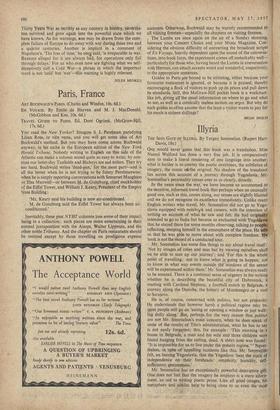Paris, France
ART BUCHWALD'S PARIS. (Chatto and Windus, 10s. 6d.)
EN VOYAGE. By Emile de Harven and M. J. MacDonald. (McGibbon and Kee, 10s. 6d.) TRAVEL GUIDE TO PARIS. Ed. Dore Ogrizek. (McGraw-Hill, 17s. 6d.)
You read the New Yorker? Imagine S. J. Perelman parodying Lilian Ross, or vie versa, and you will get some idea of Art Buchwald's method. But you may have come, across Buchwald anyway, in his niche in the European edition of the New York Herald Tribune. Nobody writing in English on this side of the Atlantic can make a column sound quite so easy to write; by con- trast our latter-day Tanfields and Hickeys are sad toilers. They try too hard. Buchwald writes 'dead-pan,' for the most parti--and is all the better when he is not trying to be funny Perelmanwise; when he is simply reporting conversations with Somerset Maugham or Elsa Maxwell—or between M. de Gunzburg, chief stockholder of the Eiffel Tower, and William J. Keary, President of the Empire State Building :
'Mr. Keary said his building is now air-conditioned.
M. de Gunzburg said the Eiffel Tower has always been air- conditioned.'
Inevitably, these past NYHT columns lose some of their impact being in a collection: such pieces are more entertaining in their normal juxtaposition with the Alsops, Walter Lippman, and the other noble Tribunes. And the chapter on Paris restaurants should be omitted except by those travelling on prodigious expense
accounts. Otherwise, Buchwald may be warmly recommended to all visiting firemen—especially the chapters on visiting firemen.
, The Lambs are once again on the air of a Sunday morning, between your Concert Choice and your Music Magazine. Con- sidering the obvious difficulty of converting the broadcast scripts of En Voyage, heavily dependent upon the sound of the conversa- tions, into book form, the experiment comes off ren?arkably well— particularly for those who, having heard the Lambs in conversation with Hermes, can attach accents weird and wonderful, respectively, to the appropriate sentences.
Guides to Paris are bound to be irritating, either because your favourite restaurant is ignored, or because it is praised, thereby encouraging a flock of visitors to push up its prices and pull down its standards. Still, this McGraw-Hill pocket book is a workman- like job, giving all the usual information on where to go and what to see, as well as a comically useless section on argot. But why do such guides so, often assume that the least a visitor wants to pay for his meals is sixteen shillings?
BRIAN INGLIS


































 Previous page
Previous page